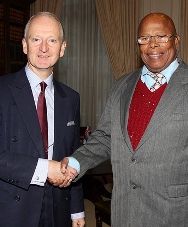Archive for January, 2011
Cayman gets positive coverage in on-line magazine
(CNS): Following the less than positive media coverage for Cayman this week as a result of Nicholas Shasxon’s book and the resurrection of Operation Tempura, Hedge Week has set things back on the more positive track started by the coverage the Cayman Islands enjoyed last week following the sinking of the Kittiwake. The on-line magazine has produce a special report about the jurisdiction and the hedge fund sector. With the financial industry ever sensitive to Cayman’s public image, Simon Gray of Hedge Week explains that the sector is no longer remaining silent when it is criticised on the world stage.
“Having a single body representing the Cayman financial services industry was long overdue, but since its establishment Cayman Finance has done well in responding to some of the misinformation about the jurisdiction,” Neal Lomax, managing partner of Mourant Ozannes tells the online industry magazine. “If there is a negative, it is that we should have started it five or six years ago.”
The special report contains articles by many of the local industry’s experts and is opened by Cayman finance chair, Anthony Travers.

Tax justice campaigners plan busy year
 (CNS): Activists that the chair of Cayman Finance, Anthony Travers, has referred to as the “Tax Taliban” say they are planning a number of campaigns in 2011 to keep up the pressure to end tax haven secrecy. Christian Aid, a leading international charity and one of the many NGOs that says offshore tax havens contribute to third world poverty, says it will be launching a new phase of the tax campaign with the launch of a global call on G20 leaders to end tax-haven secrecy. “Without this secrecy, multinational companies would find it much harder to dodge tax in developing countries,” said Helen Collinson, Christian Aid’s economic justice campaign manager on the charity’s website.
(CNS): Activists that the chair of Cayman Finance, Anthony Travers, has referred to as the “Tax Taliban” say they are planning a number of campaigns in 2011 to keep up the pressure to end tax haven secrecy. Christian Aid, a leading international charity and one of the many NGOs that says offshore tax havens contribute to third world poverty, says it will be launching a new phase of the tax campaign with the launch of a global call on G20 leaders to end tax-haven secrecy. “Without this secrecy, multinational companies would find it much harder to dodge tax in developing countries,” said Helen Collinson, Christian Aid’s economic justice campaign manager on the charity’s website.
However, Travers has referred to this position as a delusional one held by “disturbed individuals” who believe that one high global rate of taxation would solve global poverty. Describing various socialist activist movements, such as the trade unions, Oxfam and Christian Aid as well as the Tax Justice Network, as the “Tax Taliban”, he said their effectiveness was diminishing as their claims “are a heresy and are unlikely to withstand the tax transparency” that Cayman demonstrates.
Christian Aid said, however, that it is working with a loose coalition of organisations inEurope, the US, Latin America and Africa leading up to November’s G20 meeting. France’s President Nicolas Sarkozy will chair the meeting, and he has already expressed an interest in tackling tax secrecy.
The charity also plans to step up its Trace the Tax campaign regarding FTSE 100 companies that Christian Aid says avoid paying tax in developing nations. They are asking supporters to write to four of the UK’s biggest multinational companies — Vodafone, Unilever, TUI Travel and Intercontinental Hotels Group — and persuade them to help trace the tax that the NGO says they have avoided paying.

Anguilla in battle with UK’s Bellingham
 (CNS): The Cayman Islands is not the only overseas territory having trouble with its budget and the UK. The Chief Minister of Anguilla, Hubert Hughes, following the refusal by the UK governor there to sign the 2011 Budget has called on the people to consider independence. In a rally held in the wake of the governor’s decision Hughes said over the years, Britain had been allowed to eat away at the country’s constitution. In an interesting parallel to Cayman the chief minister in Anguilla has said his government was trying use capital projects such as the construction of a Sea Port to attract foreign investment to stimulate economic activity after the previous government had over spent and over borrowed. Now however Hughes claims the UK is trying to destroy his plans for recovery.
(CNS): The Cayman Islands is not the only overseas territory having trouble with its budget and the UK. The Chief Minister of Anguilla, Hubert Hughes, following the refusal by the UK governor there to sign the 2011 Budget has called on the people to consider independence. In a rally held in the wake of the governor’s decision Hughes said over the years, Britain had been allowed to eat away at the country’s constitution. In an interesting parallel to Cayman the chief minister in Anguilla has said his government was trying use capital projects such as the construction of a Sea Port to attract foreign investment to stimulate economic activity after the previous government had over spent and over borrowed. Now however Hughes claims the UK is trying to destroy his plans for recovery.
He said the UK had no difficulty in allowing his predecessor to pass a budget but they refused three attempts byhis administration. In what appears to be a problem with the number of civil servants and the cost of the public sector, Hughes said the policies which the UK was trying to impose would spiral Anguilla into an irrecoverable situation.
“We have to determine whether we are going to start seriously to move towards independence or allow the British to continually increase their powers,” Hughes told the people
“This economic crisis tells us that we cannot be afraid any longer to talk about independence. I pledge to you that we will not let this matter rest anymore. …The immediate issue is that you have to raise your voices with your Government and make sure that Anguilla is the winner in this crisis,” he added.
The UK has reportedly asked the Anguillan government to step aside from the budgetary process and have two independent experts draw-up and implement a revised budget, a three year fiscal forecasts; and a three year cash-flow management.
The OT Minister Henry Bellingham has rejected the Anguillan government’s ability to balance the budget pointing to the "failure to act to reduce expenditure."
Hughes’s budget had focused on new taxes and revenue generation to limit the exposure of the public service layoffs but the UK has rejected his proposals they, Bellingham said, did not meet his conditions, and that the budget had projected an overall increase rather than a decrease in expenditure.
Barclays Cayman toxic debt move queried by UK MPs
(Telegraph): Suspicions about a scheme devised by Barclays during the financial crisis to spin off its toxic debt have been reinforced by the lack of detail in the deal’s only public disclosure to date. Asked about Protium by MPs on Tuesday, Bob Diamond chief executive said: "We had some illiquid assets that were sold, so Protium is not a part of Barclays." Under a plan orchestrated by Barclays’ investment bank the lender sold $12.3bn risky sub-prime assets in September 2009 to Protium Finance, a Cayman Islands registered fund. Protium was financed by a $12.6bn loan from Barclays and staffed with about 45 Barclays bankers. The arrangement allowed Barclays to "derecognise the assets" – kicking a risky problem "into the long grass", as one analyst said.
At the time, Alistair Milne, a banking professor at Cass Business School, described the deal as "murky" and "suspicious".
Protium is registered at Ugland House, identified by President Barack Obama as "either the biggest building or the biggest tax scam on record". Bar the profit in London, 16 months on, details of the deal remain opaque, though there is no suggestion it is a tax scam.

Turtle Farm can sustain discount sale say officials
 (CNS): While officials from the Cayman Turtle Farm have claimed that the significant increase in the price of meat was essential to the facility’s survival and future meat production it is continuing on with the Christmas sale prices as it says it can sustain them at present. In a statement released Wednesday afternoon the farm said turtle meat and menavelin would remain at discount prices for those buying in bulk throughout this month. Cayman Turtle Farm Managing Director Tim Adam said, not surprisingly, that the holiday-season price cuts had proven tremendously popular and a decision was made to keep them at discounted levels. He explained that the farm aimed to monitor prices and production levels and reduce the cost of the meat whenever possible.
(CNS): While officials from the Cayman Turtle Farm have claimed that the significant increase in the price of meat was essential to the facility’s survival and future meat production it is continuing on with the Christmas sale prices as it says it can sustain them at present. In a statement released Wednesday afternoon the farm said turtle meat and menavelin would remain at discount prices for those buying in bulk throughout this month. Cayman Turtle Farm Managing Director Tim Adam said, not surprisingly, that the holiday-season price cuts had proven tremendously popular and a decision was made to keep them at discounted levels. He explained that the farm aimed to monitor prices and production levels and reduce the cost of the meat whenever possible.
“Understanding the traditional value and the sentimental place of turtle meat in Cayman culinary traditions, we are happy that we can continue commercial supplies to the community, while simultaneously maintaining our management programmes for green sea turtles,” he said.
Adam said the lower prices would remain in effect at least for the month of January on a first-come, first-served basis.
Prices are now set at $12 per pound for stewing meat and $9 per pound for menavelin. Turtle steak is also discounted to $20.25 per pound. Purchasers are required to buy in 5-pound lots.
The holiday price reductions discounted 2010 increases that had pushed turtle stew from previous long-standing levels of $5.40 per pound to $16, and menavelin from $4 to $12. The price hikes had formedpart of efforts to reduce consumption and enable replenishment of the farm’s turtle stocks, the farm had said.
Adam said that the increases through 2010 had assisted in the management of the 8,000-member herd because of a drop in demand and as a result supplies remained sustainable. “To maintain supplies at sustainable levels, we need to continue careful management, and we think that, by and large, the community both understands and supports our efforts,” he said.
“We will monitor demand at these new prices to determine what further price adjustments may be necessary from time to time. Our intention is to adjust prices periodically so as to better balance demand against the sustainable amount we can supply. That will give us the best opportunity to continue providing turtle meat to our valued customers in the Cayman Islands,” he said.

Experts warn not to bank on hedge-fund gold rush
 (WSJ): A sign the financial world may be returning to normal hedge -fund start-ups in 2010 reached the highest level since the boom, with 715 new funds launched in the first nine months of the year, according to Hedge Fund Research. But would-be hedge-fund tycoons shouldn’t get their hopes up. The industry is seeing net inflows after two years of bleeding assets, with a strong uptick at the end of last year. Pension funds are increasing allocations. But many of last year’s launches were new funds created by existing managers. For all but a handful of stars, starting a new firm is much tougher now than it was during the boom. The biggest challenge is that many hedge funds are struggling to demonstrate the outperformance required to justify their fees.
(WSJ): A sign the financial world may be returning to normal hedge -fund start-ups in 2010 reached the highest level since the boom, with 715 new funds launched in the first nine months of the year, according to Hedge Fund Research. But would-be hedge-fund tycoons shouldn’t get their hopes up. The industry is seeing net inflows after two years of bleeding assets, with a strong uptick at the end of last year. Pension funds are increasing allocations. But many of last year’s launches were new funds created by existing managers. For all but a handful of stars, starting a new firm is much tougher now than it was during the boom. The biggest challenge is that many hedge funds are struggling to demonstrate the outperformance required to justify their fees.

US alarmed by Chinese investment in Bahamas
 (The Guardian): American diplomats feared heavy Chinese investment in the Bahamas, including in a luxury hotel, would destabilise US influence in a post-Castro Caribbean, according to leaked state department cables. Chinese banks invested $2.5bn in the 1000-acre Baha Mar hotel complex in April 2010, one of several Sino-Bahamian deals which cables suggest the US embassy monitored closely. Diplomats were frightened the investment would leave the Bahamian government "indebted to Chinese interests for years to come", a cable from September 2009 reveals. They also repeated Bahamian politicians’ fears that "China is using this investment solely to establish a relationship of patronage with a U.S. trading partner less than 190 miles from the United States."
(The Guardian): American diplomats feared heavy Chinese investment in the Bahamas, including in a luxury hotel, would destabilise US influence in a post-Castro Caribbean, according to leaked state department cables. Chinese banks invested $2.5bn in the 1000-acre Baha Mar hotel complex in April 2010, one of several Sino-Bahamian deals which cables suggest the US embassy monitored closely. Diplomats were frightened the investment would leave the Bahamian government "indebted to Chinese interests for years to come", a cable from September 2009 reveals. They also repeated Bahamian politicians’ fears that "China is using this investment solely to establish a relationship of patronage with a U.S. trading partner less than 190 miles from the United States."
The embassy had been concerned for several years about China’s involvement in the Bahamas. They previously worried that Chinese activity in the Bahamas constituted "a strategic move [in preparation] for a post-Castro Caribbean", and questioned China’s interest "in a country where apart from geography, there would seem to be few mutual cultural, tourist, economic, or political interests", according to cables from 2003 and 2004.

Bridger pursues complaint re-Operation Tempura
 (CNS): The trials and tribulations following the UK’s Special Investigation Team (a.k.a. SPIT) and Operation Tempura are back in the news. A feature piece in today’s edition of the UK’s Financial Times reveals that the story is not over. Martin Bridger (left), the Senior Investigating Officer and head of SPIT, who was driven out after the entire operation was discredited (but not after it had cost Cayman millions of dollars), is pursuing an official complaint against the FCO and the Governor’s Office. The UK paper reveals that the current governor has asked a London-based QC for advice on how to handle the complaints and Benjamin Aina reportedly gave Duncan Taylor a report on the matter just before Christmas. (Photo from the UK’s Daily Mail)
(CNS): The trials and tribulations following the UK’s Special Investigation Team (a.k.a. SPIT) and Operation Tempura are back in the news. A feature piece in today’s edition of the UK’s Financial Times reveals that the story is not over. Martin Bridger (left), the Senior Investigating Officer and head of SPIT, who was driven out after the entire operation was discredited (but not after it had cost Cayman millions of dollars), is pursuing an official complaint against the FCO and the Governor’s Office. The UK paper reveals that the current governor has asked a London-based QC for advice on how to handle the complaints and Benjamin Aina reportedly gave Duncan Taylor a report on the matter just before Christmas. (Photo from the UK’s Daily Mail)
Last year UK barrister Martin Polaine, who was the anti-corruption legal expert that advised Bridger during Operation Tempura, was disbarred from the profession as a result of his involvement in the case which had led to the unlawful arrest of Justice Alex Henderson. He told CNS in November that he had dropped the complaint he had made to the Foreign and Commonwealth and the Governor’s Office against “those who behaved in certain ways in relation to Operation Tempura” as he had lost faith and trust in the enquiries.
Polaine said he had no confidence in Aina but when pressed would not reveal the details of the complaint or why he was no longer pursuing it. “It would be inappropriate of me to go into detail at this stage. I can simply say that my complaint related to sections of the judiciary, to the Attorney General’s Chambers and the FCO. Given that Mr Aina’s enquiries may be continuing, notwithstanding my withdrawal, I am unable to say any more at the moment,” he told CNS.
“‘I stand by what I have told them, but can go on as a complainant no longer. My life has been ruined, even though I was acting in good faith at all times and was simply seeking to conduct myself professionally and properly. I now know that I have been beaten,” the former attorney added.
Bridger, however, appears not to have been beaten and is continuing to pursue the complaint which had originally been made by both men.
According to the FT, which says it has Aina’s report, Bridger and Polaine complain that the chief justice, who had made an earlier ruling in the case, spoke to Justice Henderson outside the courtroom about his relationship with John Evans, the former Net News journalist involved in the issues, which triggered the arrival of SPIT in Cayman. They also say the chief justice went to see Henderson at the police station after his detention and, without notifying the arresting officers, spoke to him in a private room.
In a February 2008 judgment, the chief justice said he did not think he should recuse himself from the case over perceived bias but had said the Tempura investigators were free to challenge his decision.
Polaine and Bridger question the role of Sir Peter Cressell, the former UK judge who presided over Henderson’s judicial review and was later appointed to the Cayman Financial Court. Polaine claims Sir Peter made findings of bad faith without supporting evidence and questions why the judge met with Anthony Smellie after arriving on the islands to hear the review. Cresswell maintains that he remained independent throughout and kept a distance from those involved.
The complaint also questions the role of Larry Covington (raised here in Cayman on a number of occasions without receiving answers) a Foreign Office law enforcement adviser whose part in the Operation Tempura fiasco has never been fully explained. Stuart Kernohan, the former police commissioner who was sacked during the investigation, had reportedly told Covington about the Cayman Net News office search. The FT further reveals that it too failed to get any further on the question of Covington as he referred the paper to the FCO press office, which did not comment.
The complaint dossier includes the issue of the allegations which were later supposedly examined under Operation Cealt by the temporary police commissioner, James Smith. Polaine states in the complaint, “Many of those who came forward said they had been waiting for years to have sufficient confidence in a team who seemed serious about tackling corruption.”
However, given the various revelations about its conduct, the question that emerged later about SPIT was whether the members were ever serious about tacking anything other than enjoying a jolly in the Caribbean at the local tax payers’ expense.
The alleged hours and hours of taped interview, which Bridger had said documented complaints about corruption and misconduct in the police and elsewhere, have never seen the light of day. The outcome of Operation Cealt, which was taken over by the current commissioner after Smith left, has never been revealed. John Evans has claimed that many of the complaints were questionable and had come from Desmond Seales, the Net News editor at the heart of the entire investigation, whom Evans suggests Bridger trusted throughout. Other sources close to the investigation have told CNS that the complaints made about corruption in the RCIPS had more to do with incompetence.
Bridger, it appears, has not given up on Operation Tempura and is implying that, rather than unravelling as a result of SPIT’s incompetence and a lack of evidence, the investigation was deliberately blocked. The impact of the fallout from SPIT was nowhere near as damaging for Bridger as it was for his colleague Polaine, who was struck off as a result of his involvement.
The former UK cop faired far better. He retired from the Metropolitan Police Service during his time here in the Cayman Islands and took up a consultancy post with the CIG as SIO of SPIT. According to an auditor general’s report, he earned more than $500,000 in salary, benefits and expenses, paid for by the Cayman tax-payer.

Police issue more warnings over text scammers
 (CNS): Despite the endless warnings from the unit that emails and text messages telling people they have won cash prizes are just about always scams, Officers from the RCIPS Financial Crime Unit, along with local telecom firm Digicel and LIME are raising the alarm again about fraudulent texts. Cell phone users are being warned to be on the lookout for a text message that suggest they’ve won a cash prize which the police have pointed out is a scam. Customers throughout the Cayman Islands have reportedly been receiving fraudulent text messages from an unknown source saying they have won thousands in a promotion but Digicel and Lime say it is not connected to them.
(CNS): Despite the endless warnings from the unit that emails and text messages telling people they have won cash prizes are just about always scams, Officers from the RCIPS Financial Crime Unit, along with local telecom firm Digicel and LIME are raising the alarm again about fraudulent texts. Cell phone users are being warned to be on the lookout for a text message that suggest they’ve won a cash prize which the police have pointed out is a scam. Customers throughout the Cayman Islands have reportedly been receiving fraudulent text messages from an unknown source saying they have won thousands in a promotion but Digicel and Lime say it is not connected to them.
“Legitimate text messages from the company are always accompanied by Digicel’s name or a four (4) digit number,” Digicel’s CEO Victor Corcoran said. “Our clients should never sending personal information, for example, bank details and addresses, to unknown or suspicious senders whether via text message or over the internet.”
Julie Hutton, Marketing Manager for LIME said the firm advises anyone who receivesa text that they are suspicious of to contact the call centre at 811. “All our promotional or informational texts come with the heading LIME. We also want to take this opportunity to remind people to be vigilant with regards to e-mails and never give out personal details including user names and passwords, LIME would never ask a customer for these details,” she added.
Sgt Michael Montaque from the FSU warned the public to watch out for all emails, faxes, text messages or letters that promise a large sum.
“Over the years, the stories used by fraudsters in these scams have become much more sophisticated and technologically advanced. There are a wide variety of scams circulating out there,” he said. “These communications will appear to come from legitimate companies. They can include company logos and addresses taken from the internet – all to make them look more legitimate and to persuade you to part with your banking details and money.
“Once you have responded with your bank details, the scammers may simply try to clean out your account. They might ask you to send them money to ‘release funds’ via money transfer. Or they may send you a fake cheque, asking you to cash it and send them a small amount to release the ‘rest of your winnings’.”
He pointed out that the best way to avoid becoming a victim is to never give out your bank details.
Further information about how to avoid becoming the victim of scams can be obtained by calling the RCIPS Financial Crime Unit on 949-8797. Digicel customers can call 100 from Digicel mobiles or 345-623-3444 from landlines for further information.

Jury pool needs to expand
 (CNS): Chief Justice Anthony Smellie has backed the call by the legal profession to expand the Cayman Islands’ jury pool beyond the electoral register. The country’s top judge warned that law reform was by no means the only way to address the issue of rising crime as he offered his support to the idea of extending the roll of jurors to include all adults lawfully resident in the jurisdiction. He said penal or punitive measures could only go so far to protect the public interest and that legislation is not meant to be a panacea to crime. The CJ also revealed that the judiciary’s advice against moves by government to remove the right to trial by jury had been accepted.
(CNS): Chief Justice Anthony Smellie has backed the call by the legal profession to expand the Cayman Islands’ jury pool beyond the electoral register. The country’s top judge warned that law reform was by no means the only way to address the issue of rising crime as he offered his support to the idea of extending the roll of jurors to include all adults lawfully resident in the jurisdiction. He said penal or punitive measures could only go so far to protect the public interest and that legislation is not meant to be a panacea to crime. The CJ also revealed that the judiciary’s advice against moves by government to remove the right to trial by jury had been accepted.
Talking about the need for the community to be more engaged in the fight against crime during his address at the opening of the Grand Court, Smellie explained the advantages to be gained by widening the net when it came to jurors.
“If adopted, [it] would not only greatly increase the number of potential jurors it would also spread all the burdens and responsibilities of jury duty across that wider base,” the judge told the audience gathered at the court house for the official ceremony. “And it follows, there would be even less to be gained for those with criminal intentions in seeking to intimidate jurors, if they were assured that the society at large refuses to be intimidated.”
The difficulty of panelling juries is an ongoing problem in Cayman as a result of the relatively small jury pool and the family connections between people. In February last year the process of jury selection in one firearms related trial with four defendants resulted in the entire jury pool for that session being dismissed for one reason or another when only four people had been sworn to serve. The court staff were then forced to literally trawl the streets of George Town to find the remaining three jurors, and when one fell ill the trial went ahead with only six people sitting on the jury.
During jury selection it is common for those who are called to serve to reveal direct connections with the defendants, the victims, the witnesses or the police involved with the case. Coupled with the right of both the crown and the defence attorneys to refuse up to five juror’s each, it can take a long time to find seven people, and in the case of murder trials twelve people, who can honestly say they are completely impartial.
With the rise in crime in the local community, the chief justice said that legislative reform was not an uncommon response but he emphasized it was not the only response and called on the community to help. “No matter how draconian the measure, it can provide no substitute for the will of society itself at large to confront the problem of crime and for the responsibility of each and every law abiding citizen to do his or her part to assist the law enforcement authorities in the response to crime. Strength in numbers is the ultimate recourse of lawful society,” the top judge said.
Noting the dangers and limitations of law reform he pointed to a recent ruling in the Court of Appeal with regard to the crown’s use of the new witness anonymity law. The Court of Appeal had explained in the ruling “why such anonymity orders should only be made in exceptional circumstances and why a witness protection programme in Cayman is likely to have only limited practicability.”
He said taken as a whole, the raft of legislative changes told the story of a society that “perceives itself as faced with a crisis” and was using legislative means to respond.
“While such a response is understandable and even to be expected, the judicial perspective must nonetheless be objective as the legislative measures arise for interpretation, implementation and enforcement. And it is then that the realities that separate the expected benefits, from the practical limitations of this kind of legislation, are likely to be tested, explained and declared,” the judge warned.
Any perceived attempt to retreat behind a legislative cloak of protection could send the wrong message, Smellie added.
He also spoke of the need to tackle the rise in violent crime in alternative ways. Following the presentation from Attorney General Sam Bulgin, the chief justice said the early and continued intervention with young people at risk could do a lot more to address the issue than legislation alone.